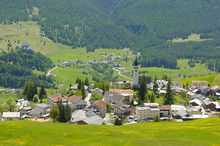Ftan
| Ftan | ||||||||||
|---|---|---|---|---|---|---|---|---|---|---|
 | ||||||||||
| ||||||||||
| Population | 532 (Dec 2012)[1] | |||||||||
| - Density | 12 /km2 (32 /sq mi) | |||||||||
| Area | 43.11 km2 (16.64 sq mi)[2] | |||||||||
| Elevation | 1,648 m (5,407 ft) | |||||||||
| Postal code | 7551 | |||||||||
| SFOS number | 3761 | |||||||||
| Surrounded by | Ardez, Galtür (AT-7), Ramosch, Scuol, Sent, Tarasp | |||||||||
| Website | www.ftan.ch SFSO statistics | |||||||||
 Ftan | ||||||||||
| Location of Ftan
 | ||||||||||
Ftan is a municipality in the district of Inn in the Swiss canton of Graubünden.
History
Ftan is first mentioned in 1150 as Vetane.[3]
Geography


Ftan has an area, as of 2006, of 43.1 km2 (16.6 sq mi). Of this area, 40.6% is used for agricultural purposes, while 15.4% is forested. Of the rest of the land, 1.2% is settled (buildings or roads) and the remainder (42.8%) is non-productive (rivers, glaciers or mountains).[4]
The municipality is located in the Suot Tasna sub-district of the Inn district on a terrace above the left bank of the Inn river. It consists of the village sections of Ftan Grond and Ftan Pitschen. Until 1943 Ftan was known as Fetan.[5]
Demographics
Ftan has a population (as of 31 December 2012) of 532.[1] As of 2008, 11.2% of the population was made up of foreign nationals.[6] Over the last 10 years the population has grown at a rate of 9.6%.[4]
As of 2000, the gender distribution of the population was 49.2% male and 50.8% female.[7] The age distribution, as of 2000, in Ftan is; 57 children or 11.0% of the population are between 0 to 9 years old. 40 teenagers or 7.8% are 10 to 14, and 84 teenagers or 16.3% are 15 to 19. Of the adult population, 39 people or 7.6% of the population are between 20 to 29 years old. 65 people or 12.6% are 30 to 39, 69 people or 13.4% are 40 to 49, and 53 people or 10.3% are 50 to 59. The senior population distribution is 43 people or 8.3% of the population are between 60 to 69 years old, 48 people or 9.3% are 70 to 79, there are 15 people or 2.9% who are 80 to 89, and there are 3 people or 0.6% who are 90 to 99.[6]
In the 2007 federal election the most popular party was the SVP which received 43% of the vote. The next three most popular parties were the SPS (42.1%), the FDP (7.7%) and the CVP (5.1%).[4]
The entire Swiss population is generally well educated. In Ftan about 81.8% of the population (between age 25-64) have completed either non-mandatory upper secondary education or additional higher education (either university or a Fachhochschule).[4]
Ftan has an unemployment rate of 0.81%. As of 2005, there were 64 people employed in the primary economic sector and about 24 businesses involved in this sector. 16 people are employed in the secondary sector and there are 6 businesses in this sector. 180 people are employed in the tertiary sector, with 25 businesses in this sector.[4]
The historical population is given in the following table:[3]
| year | population |
|---|---|
| 1835 | 538 |
| 1850 | 506 |
| 1900 | 403 |
| 1950 | 504 |
| 1970 | 425 |
| 2000 | 516 |
Languages
Most of the population (as of 2000) speaks Rhaeto-Romance (57.8%), with German being second most common (37.0%) and Italian being third ( 1.2%).[4]
| Languages in Ftan | ||||||
| Languages | Census 1980 | Census 1990 | Census 2000 | |||
| Number | Percent | Number | Percent | Number | Percent | |
| German | 139 | 31.95% | 153 | 33.77% | 191 | 37.02% |
| Romansh | 251 | 57.70% | 263 | 58.06% | 298 | 57.75% |
| Italian | 19 | 4.37% | 14 | 3.09% | 6 | 1.16% |
| Population | 435 | 100% | 453 | 100% | 516 | 100% |
References
- ↑ 1.0 1.1 Swiss Federal Statistics Office – STAT-TAB Ständige und Nichtständige Wohnbevölkerung nach Region, Geschlecht, Nationalität und Alter (German) accessed 16 September 2013
- ↑ Arealstatistik Standard - Gemeindedaten nach 4 Hauptbereichen
- ↑ 3.0 3.1 Ftan in German, French and Italian in the online Historical Dictionary of Switzerland.
- ↑ 4.0 4.1 4.2 4.3 4.4 4.5 Swiss Federal Statistical Office accessed 12-Oct-2009
- ↑ Amtliches Gemeindeverzeichnis der Schweiz published by the Swiss Federal Statistical Office (German) accessed 23 September 2009
- ↑ 6.0 6.1 Graubunden Population Statistics (German) accessed 21 September 2009
- ↑ Graubunden in Numbers (German) accessed 21 September 2009
| Wikimedia Commons has media related to Ftan. |
- This article incorporates information from the equivalent article on the German Wikipedia.
| |||||||
